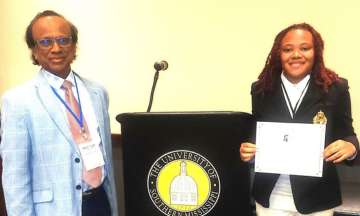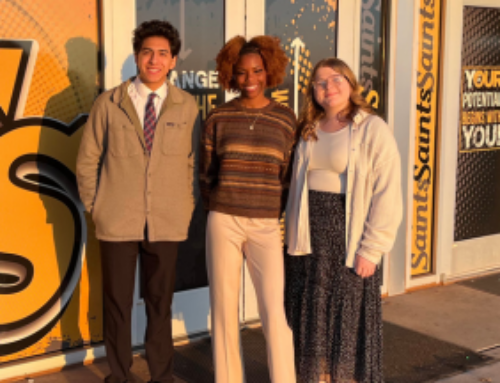Amya Jackson, a senior at Alcorn State University, has been awarded 2nd place in the undergraduate oral competition for her research presented at the Mississippi Academy of Sciences (MASS) 84th Annual Meeting. The event, held in Hattiesburg, Miss., featured divisions spanning various scientific disciplines.
According to MASS, the divisions judged included agriculture and plant sciences; cellular, molecular, and developmental biology; chemistry and chemical engineering; geology and geography; health sciences; marine and atmospheric sciences; mathematics; computer science and statistics; microbiology and immunology; physics and engineering; psychology and behavioral neuroscience; science education; and zoology and entomology.
Jackson, a native of Greenville, Miss., conducted research on the long-term application of animal and plant waste on a vineyard and its impact on yield and soil health.
“This is 17 years of research,” said Jackson. “Alcorn was the first to start this research. I have been working on it for the past two years. Still, the work continues. It is in collaboration with Cornell University’s Soil Health Science Lab. They analyzed our soil.”
Girish Kumar Panicker, Ph.D., professor of Plant and Soil Sciences and director of Conservation Research Center for Conservation Research at Alcorn State University, said, “It indeed was a tough competition, but Amya’s hard work paid off! According to the National Soil Health Lab of the USDA/NRCS at Cornell University, this is the first long-term research on animal waste management in vineyards in the nation. Cornell’s Soil Health Lab analyzed the soil samples since no other lab specializes in studying these kinds of soil samples in the nation. With our permission, Cornell is using our data for training visiting scientists. This research will continue for 25 years in 2025, making history in soil health studies around the world. Cornell rated this research as ‘Excellent.’”
Reflecting on her achievement, Jackson expressed her gratitude for being part of such an exclusive research project.
“I felt great about winning second place because Dr. Panicker has worked on this research for several years. I was honored to be a part of a research project this exclusive,” said Jackson.
Looking ahead, Jackson plans to continue her research with Dr. Panicker. As for her career plans, she remains undecided about pursuing graduate school at this time.




